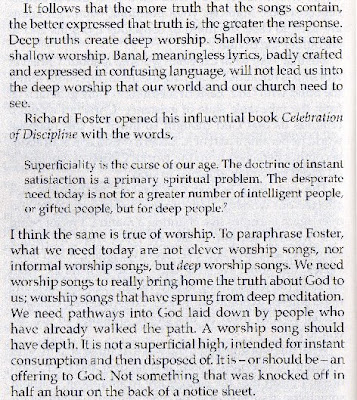
I have been reminded again this weekend of Tim Chester's post,
"Communities of Performance Verses Communities of Grace" . First time I read it, and blogged about it, the thing which stood out for me was the issue of vulnerability of leaders, and the danger of the hypocrisy of projecting an image of being 'sorted' rather than the honesty of revealing that we are sinners saved by grace alone.
As someone else read Chester's criteria to me this morning however, a different part of it jumped out and grabbed my attention - mostly because it was something that resonated with what my wife had been saying during the week. Chester writes:
In the community of performance, identity is found in ministry whereas in the community of grace, identity is found in Christ.
Of course theologically we know this is the case. In practice though, what weight does this truth have in how we view ourselves before God - and (just as importantly) how we view others? One person who grappled with this very issue was the famous Welsh preacher D. Martyn Lloyd-Jones (1899-1981). Arguably the leading non-Conformist preacher of his day, he spent half a century preaching many times a week, to large congregations. When illness and old age curtailed his ministry, he was asked how he coped. He answered by quoting the words which Jesus said to his disciples when they experienced their first ministry success:
“Rejoice not that the spirits are subject unto you; but rather rejoice, because
your names are written in heaven”. (Luke 10:20)
And commented:
Bear in mind.. our greatest danger is to to live upon our activity. The ultimate test of a preacher is what he feels like when he cannot preach. Our relationship to God is to be the supreme cause of joy. To lean upon our sermons or words of testimony from others is a real 'snare of all preachers’”.(Murray, vol 2, p738)
Lloyd-Jones makes the point in relation to preaching but the same principles can be applied to whatever field of Christian service we have been gifted for and called to do. Do we base our identity on what we do for The Lord - or who we are in Him? If we are primarily focused on the 'what', then we are in precarious territory, as our well-being and relationships will be dangerously performance orientated. How will we fare if we fail to perform, or when others fail? On the other hand, if being sinners, loved by God, saved by Christ, indwelt by the Spirit, adopted into his family, made heirs together with Christ and being seated with him in the heavenly realms is how we identify ourselves and others we fellowship with, then the effects are revolutionary.
Firstly with regard to ourselves. The security of our identity in Christ, provides the kind of stability that a performance mindset never could. It does not make us less determined to minister well in our own field, but means that when we fail it will not threaten the core of our identity. Likewise it means that we can be liberated from the need to seek the constant approval of others - knowing that, in Christ, God has freely given us His approval. It means that we do not need to aspire to prominence, control, power or influence in order to prove ourselves - but can quietly and diligently serve in the capacities to which we are called.
Secondly with regard to others, the change from a 'ministry' to a 'Christ-centered' view of identity is also significant. While some might argue that there is a hierarchy of giftings; this bears no relevance to the value we place in people, which remains absolute, regardless of calling, gifting, age etc. The old, hackneyed cliche that the church must value the cleaner as much as the preacher, has become corny due to over-use; but its relevance has not lessened one bit. Someone told me a few months ago that he has only really felt welcomed in the church once he had begun to take part, 'up the front' - as if this ministry role had somehow made him more worth speaking to! This is scandalous, because he was the same person made in the image of God, spoiled by sin and redeemed by Christ, and gifted by the Holy Spirit, both before and after he had led from the front! His ministry might have developed, but his value, and identity had not changed!
Forging our identities in Christ is not easy however. It requires not merely faith, but also a level of humility I have only rarely seen. An identity based on Christ requires deep repentance, not merely the listing of specific faults an failures, but an honesty about our falleness before God and others. It requires that we not only abandon the private attempt to justify ourselves to God, but instead seek His forgiveness; and then the abandonment of the public impression that we are self-made. The truth is that the gospel first demolishes our pride as we see our sinfulness, then remakes us as we discover how utterly loved we are by the God who forgives.
When Jesus selected leaders for his movement, he did not go to the temple, to the established religious orders of scribes, Pharisees and Sadducee's - but instead selected a strange collection of fishermen, tax-collectors, zealots and unremarkables. Yet to these outsiders, these humble men - aware of their own lack of qualification for service in Christ's kingdom, he warned; "Beware of the yeast of the Pharisees". And what is this yeast, this tiny amount that can alter the consistency and taste of the whole batch? Self-righteous certainty, rule-keeping external holiness accompanied by a hard graceless heart, a cruel hierarchical view of people based on human performance, which flows from the heinous and crippling sin of spiritual pride. In fact we might say that the yeast of the Pharisees looks a little like the performance based church!
Like those first disciples, we are nothing much in human terms. We don't have any claim to be worthy servants of The Lord Jesus Christ - far from it! Rather, any and every service (however small it may appear to others) entrusted to us by Him is an unspeakable privilege. We haven't come to Him to offer our money, advice, wisdom or tremendous abilities - rather each of us has come to Him with nothing to offer - seeking only His forgiveness. Yet, if those disciples needed to be warned that they could insidiously be seduced away from a grace to performance mindset; how much more do we need to keep reminding ourselves of these things, and exposing our sins that we find present. And here's the other side of the coin - we do not need to fear such an exposure of our sins - because we are loved by God despite them, our new identity in Christ completely unthreatened by them.



















































